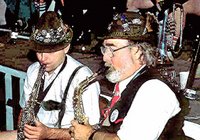I LOVE MUSIC AND ALASKA FOLK FESTIVALS
I was very active in high school music – especially the marching band. My first US Air Force assignment, before going on to flying school, was the 541st AF Band at Williams AFB, Arizona. Alas, base bands now are a thing of the past (replaced for cost efficiency with regional military bands). But I do enjoy military music – nothing beats a rousing John Phillip Sousa or Carl Teike march.
Military music is also a kind of distant cousin to “oompah band” Oktoberfest music. For many years, before immigrating to Alaska, I played sax in the big “American Bavarian Brass Band” in California (known affectionately as the “Pass Gassers”). In addition to blowing sax in that band, I was also Chicken Dance Demonstrator at band performances. Don’t tell anyone. I want to be re-elected!

All of this (unnecessary, but pleasingly nostalgic) preamble brings me to the great annual Alaska Folk Festival in Juneau that – praise be – comes to town in April, during the time I’m in Juneau for the legislative session. The folk musicians come at their own expense from every nook and cranny of Alaska to perform to an enthusiastic audience. And it’s all free – which appeals to my fiscal conservatism.
A different Festival group performs every fifteen minutes. So, if you don’t like one group, it’ll quickly be replaced by another. Almost without exception, performers are highly talented. When I see these kinds of local talent performing, I can’t believe they’re not major performing artists making millions of bucks (I guess they’re not lucky enough to be in the right place, at the right time. Somehow, it doesn’t seem fair). The wonderful performers at the Folk Festival come from every walk of life in Alaska. They love performing. I love listening!
The most common performance at the Alaska Folk Festival is Bluegrass Music. It’s a high energy, foot-stomping, and technically challenging variety of acoustic string music (guitar, banjo, mandolin, string bass) with improvised solos. The cultural ancestor of bluegrass music is Celtic, and Northern Ireland – especially the everyday music of Scotch Protestants who were settled by the British in a “plantation” in Ulster Province as a counterforce to indigenous Irish Catholics. We refer to them today as the “Scotch-Irish.” Interestingly, I’m Catholic, but most of my genealogy is Scotch-Irish Protestant, not Irish Catholic (obviously, another mark of non-conformity).
In years preceding the American Revolution and the 1776 Declaration of Independence, hundreds of thousands of Scotch-Irish left Ulster and emigrated to America. My ancestors were among them. A large number of Scotch-Irish settled in remote and isolated vallies of the Appalachian Mountains. They brought their ancestral music with them. In “mountain music,” as this genre of music is sometimes termed, hear the old chord progressions, close harmonies, and vocalistic styles of its ancient Scotch-Irish musical heritage. Mountain music is the common ancestor of country western, and especially Bluegrass. It’s a derivation of the music that came across the ocean from Northern Ireland and, before that, Celtic homelands in Europe.
I really enjoy the Juneau Folk Festival. Good music. Good people. My favorite performers at this year's Alaska Folk Festival were “Belly Meat” from Sitka, "Barefoot Bluegrass" from Anchorage, and especially “Bluegrass 101” from Juneau.

0 Comments:
Post a Comment
<< Home